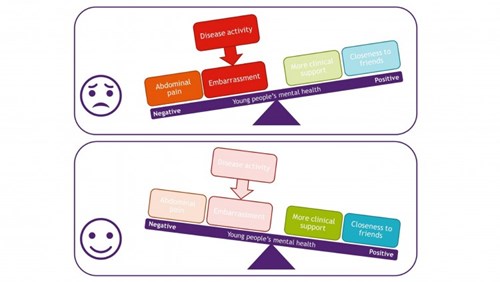In this new article, published in the journal of Quality of Life Research, Pam, Bernie and their team present the results of their 'Being Me With IBD' study. They asked 130 young people who have Crohn's or Colitis - the two main forms of Inflammatory Bowel Disease (IBD) - about their feelings of depression, anxiety, loneliness, friendship quality, and embarrassment.
They found that experiencing more severe symptoms, such as tummy pain, was related to developing mental health problems.
Essentially, their research shows that an unpredictable bout of disease activity -such as a flare -causes anxiety and embarrassment about symptoms like pain, belly noises, incontinence and/or need to rush to the toilet. This leads to not wanting to take part in social activities and this can lead to loneliness and poor mental health.


The team hope that this study will increase the recognition of this problem and open up more opportunities for young people with Crohn's or Colitis to talk about their mental health in clinic. This would provide them with clinical support to address the challenges associated with Crohn's and Colitis, including the impact it has on social activities and mental health. Our findings shine a light on aspects of Crohn's and Colitis that are of importance to young people, but which may be overlooked in clinic visits.
Typically, consultations do not address young people's feelings, mental health, or the challenges that these conditions can create for sustaining friendships and connectedness. While the focus on physical symptoms is important, our study reveals the importance of creating opportunities for talking about well-being and mental health.
Professor Bernie Carter
Co-lead of the Being Me with IBD study, Edge Hill University

While it was not a surprise to find that mental health challenges were common among adolescents and young adults with IBD, we found that those were brought about because of the embarrassment surrounding the condition and the perceived negative impact symptoms had on friendships.
It seems important, then, that patients have opportunities to discuss their mental health within their usual clinics, and that sustained friendships with peers are encouraged. In addition, our findings highlight the need to increase awareness of Crohn's and Colitis, increasing the scope for compassion and understanding among youth.
Professor Pam Qualter
Co-lead of the Being Me with IBD study, University of Manchester
The team's next steps include developing information sheets for parents of adolescents and young adults with Crohn's or Colitis. These aim to help support them in engaging in open and honest discussion about their conditions. We're really thrilled that Bernie and her team will be presenting this work as an interactive 'virtual poster' at our next IBD Patient and Public Involvement in Research Day on Saturday 17th October 2020.
The results of our recent Life in Lockdown survey suggest that these findings are particularly relevant and important just now, with almost half of people with Crohn's and Colitis reporting that their mental health has been negatively impacted by the coronavirus pandemic.
We are incredibly proud to support the research that Bernie, Pam and their team have produced as part of their 'Being Me With IBD' project. It has shone a light on the need for extra mental health support for young people with Crohn's and Colitis and, by identifying the root causes, provides the tools to address the problem clinically.
We hope that this takes us a step closer to improving the mental wellbeing for thousands of young people with Crohn's and Colitis.
Dr Jane Fraser
Research Programme Officer, Crohn's & Colitis UK
Please remember that if you ever need to talk about your condition, or that of a loved one, our fantastic Helplines team are here to help. We also have a new, comprehensive mental health and wellbeing resource that you might find helpful.
Related information:
- Read their most recent publication for free
- Find out more about the 'Being Me With IBD' project funded by Crohn's & Colitis UK
- Access the free information sheets developed by Bernie's team
- See how we are working to tackle pain in Crohn's and Colitis

